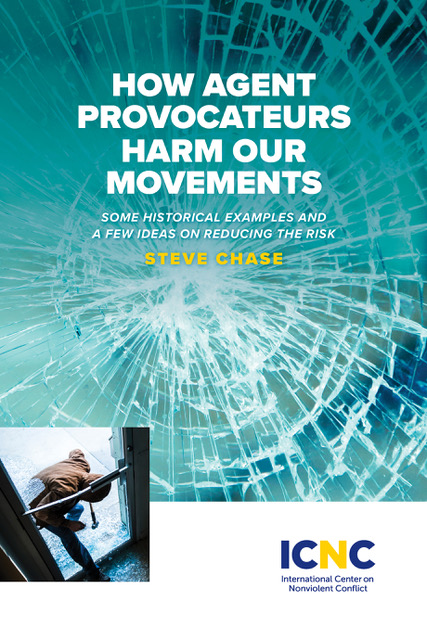By Steve Chase
Date of Publication: November 2021
Free Download: English | Spanish
Purchase a Print Copy
Purchase an e-book (Nook | Kindle)
“Steve Chase’s book is valuable in this new period when governments are likely to plant agent provocateurs. Steve’s alternatives to ‘security culture’ (which breaks down trust we need for strong movement organizations) become all the more important.”
– George Lakey, Author of How We Win: A Guide to Nonviolent Direct Action Campaigning
 History shows us that peoples’ movements are more likely to succeed when they have unity among supporters, widespread participation, strategic planning, and nonviolent discipline. Unsurprisingly, movement opponents use agent provocateurs—fake activists working undercover—to behave in counterproductive ways that undermine these four keys to success.
History shows us that peoples’ movements are more likely to succeed when they have unity among supporters, widespread participation, strategic planning, and nonviolent discipline. Unsurprisingly, movement opponents use agent provocateurs—fake activists working undercover—to behave in counterproductive ways that undermine these four keys to success.
Drawing from international examples and an in-depth case study of the US Black Liberation Movement, this volume explores how agent provocateurs—and agent provocateur-like behavior—make movements smaller, weaker, and easier to defeat. It also offers some ideas for how activists can inoculate their movements against such harms and increase their chances of success.
Watch the Webinar Recording: On January 18, 2022, Steve Chase presented a webinar on his book and facing the challenge of agent provocateurs. Watch the video.
About the Author
 Steve Chase is a long-time activist, educator, and writer. He has been an editor at South End Press, the founding director of Antioch University’s master’s level activist training program in Advocacy for Social Justice and Sustainability, and the Manager of Academic Initiatives for the International Center on Nonviolent Conflict. He is currently the Assistant Director of Solidarity 2020 and Beyond, a solidarity network and community of practice for grassroots movement organizers in the Global South using advocacy, peacebuilding, and nonviolent resistance to win sustainability, rights, freedom, and justice. He is also a contributor to Minds of the Movement and Waging Nonviolence.
Steve Chase is a long-time activist, educator, and writer. He has been an editor at South End Press, the founding director of Antioch University’s master’s level activist training program in Advocacy for Social Justice and Sustainability, and the Manager of Academic Initiatives for the International Center on Nonviolent Conflict. He is currently the Assistant Director of Solidarity 2020 and Beyond, a solidarity network and community of practice for grassroots movement organizers in the Global South using advocacy, peacebuilding, and nonviolent resistance to win sustainability, rights, freedom, and justice. He is also a contributor to Minds of the Movement and Waging Nonviolence.
,
Reviews and Commentary
“How to Counter the Growing Threat of Agent Provocateurs” by George Lakey, Waging Nonviolence
“Review: Protecting Movements from Infiltrators” by Arnie Alpert, InZaneTimes
“What Can We Learn from Agent Provocateurs” by Steve Chase, Minds of the Movement
“Michael Beer’s Review of Steve Chase’s Book on Agent Provocateurs” by Michael Beer, Nonviolence International
“Fighting Agents Provocateurs Nonviolently” (an interview with Steve Chase), Northern Spirit Radio